Every now and then we offer a BookNotes list of titles that we are excited about not only because of the important content and inspiring messages of the books but especially because of the remarkable talent and glorious writing styles of the authors. What a pleasure to share time with really good writers. After spending a number of wonderful hours with a few of 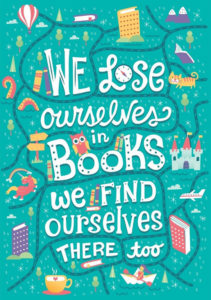 these I knew I had to tell you firstly about how well written they are, how much delight the wordplay and storytelling will bring, and then how they will help you learn and grow and see the world anew. With that in mind I jettisoned a few that were important but not utterly lovely and a few that I liked but didn’t love. There are plenty of excellent, important books. These ten are great because they are beautiful, so very nicely done, each in their own way, all well crafted and pleasing to read, even if the content includes some very hard stuff.
these I knew I had to tell you firstly about how well written they are, how much delight the wordplay and storytelling will bring, and then how they will help you learn and grow and see the world anew. With that in mind I jettisoned a few that were important but not utterly lovely and a few that I liked but didn’t love. There are plenty of excellent, important books. These ten are great because they are beautiful, so very nicely done, each in their own way, all well crafted and pleasing to read, even if the content includes some very hard stuff.
In an impassioned song that has inspired a wanna-be writer like me, singer-songwriter Nanci Griffith sings “bring the prose to the wheel.” I don’t know what that means, exactly (she’s singing about reading on a bus, I think, but, man…) These authors do it. They worked hard to steward their writerly gifts and they artfully told their truths, creating books that you will truly enjoy.
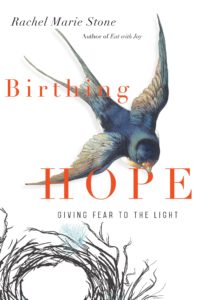 Birthing Hope: Giving Fear to the Light Rachel Marie Stone (IVP) $16.00 I think I am more grateful for this book then nearly anything I’ve read this season and Stone’s well-crafted prose is certainly among the very best writing I’ve encountered in a Christian book in ages. I have promoted this before I spent much time with it by stating the obvious: she is a doula and she works the birthing metaphor beautifully. What a great move, talking about bringing something new to the world by being vulnerable and taking up risk, like parents do. There’s some vivid childbirth stories and plenty of bodily talk about womanly stuff. (I do not buy any assumptions of squeamishness about this attributed to guys; women and men alike may be squeamish and women and men alike will take it all in with wide-eyed wonder. This powerful bit of prose is not a “woman’s book” although surely many will love it.)
Birthing Hope: Giving Fear to the Light Rachel Marie Stone (IVP) $16.00 I think I am more grateful for this book then nearly anything I’ve read this season and Stone’s well-crafted prose is certainly among the very best writing I’ve encountered in a Christian book in ages. I have promoted this before I spent much time with it by stating the obvious: she is a doula and she works the birthing metaphor beautifully. What a great move, talking about bringing something new to the world by being vulnerable and taking up risk, like parents do. There’s some vivid childbirth stories and plenty of bodily talk about womanly stuff. (I do not buy any assumptions of squeamishness about this attributed to guys; women and men alike may be squeamish and women and men alike will take it all in with wide-eyed wonder. This powerful bit of prose is not a “woman’s book” although surely many will love it.)
Really, though, this book, besides being about “birthing hope” is about coping with fright and anxiety; don’t miss the important sub-title! Stone could be a major memoirist the way she narrates her life and, like any good memoirist, she can turn fairly common place memories like being afraid of swimming or more eccentric ones such as her girlhood fascination with her Jewish heritage and a fear of the another holocaust, into golden insights. Each chapter explores themes or episodes or fears and they are like their own marvelous short stories.
Her reflections from her girlhood days, her young adult years, her stint in medical missions in Malawi, and her vocation as a young mother, all disclose so much goodness even though many of the stories are freighted, heavy with sadness or perplexities. I love her writing and am grateful for her wise teaching. I love the cover, too, by the way, which is glorious to hold.
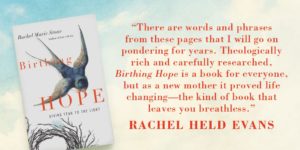
The excellent writer Amy Julia Becker (you’ve got to read her memoir A Good and Perfect Gift: Faith, Expectations, and a Little Girl Named Penny and the very lovely Small Talk: Learning from My Children about What Matters Most ) says of it: “Birthing Hope drew me in from the first page to the last. “
Wesley Hill writes:
In Stone’s hands, birth is not only a sacrament of solidarity, a sign of hope amid the chaos of doubt and fright, but also a reminder that, for all our talk of immortal souls, we have and are bodies, fearfully and wonderfully made.
Lauren Winner, herself an amazing wordsmith and talented storyteller and hardworking writer, says this:
I love this book. You needn’t have given birth to love it. Maybe you don’t even have to be curious about God or life as a human being to love it – the prose is that strong and compelling, that perhaps even the God-and-human-uncurious might love it.
I think she is right — all sorts of readers will love this, and we are eager to celebrate it, promote it, helping get the word out about it luminous writer and beautiful storytelling and deep insight.
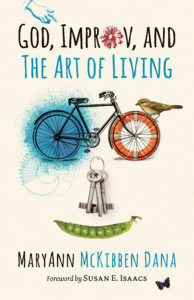 God, Improv, and the Art of Living MaryAnn McKibben Dana (Eerdmans) $21.99 Oh man, this is a fabulous book, well-written, creative, and very interesting. It is a brand new release that I can honestly say – I love saying this! – that there is nothing like it in print! Ms. McKibben Dana is a good storyteller and a fine, fine essayist – her first book was the lively year-long memoir called Sabbath in the Suburbs: One Family’s Experiment with Holy Time – and here she offers a blend of creative reflection on her experiences, some artful self-helpy sort of practical guidance, a bit of allusive theology (she is a Presbyterian USA pastor, a bit progressive and open.) It’s well written, entertaining, and in many ways wise.
God, Improv, and the Art of Living MaryAnn McKibben Dana (Eerdmans) $21.99 Oh man, this is a fabulous book, well-written, creative, and very interesting. It is a brand new release that I can honestly say – I love saying this! – that there is nothing like it in print! Ms. McKibben Dana is a good storyteller and a fine, fine essayist – her first book was the lively year-long memoir called Sabbath in the Suburbs: One Family’s Experiment with Holy Time – and here she offers a blend of creative reflection on her experiences, some artful self-helpy sort of practical guidance, a bit of allusive theology (she is a Presbyterian USA pastor, a bit progressive and open.) It’s well written, entertaining, and in many ways wise.
But here’s the thing: yup, the subtitle isn’t messing with you. This is a story of the author’s many years taking an improv comedy class and her involvement in improv shows. The subtitle could be “what I learned about life and faith in improv comedy class.” That comedian Susan Isaac wrote the forward should be a clue to something (and, I’m not kidding, I really, really loved Susan’s excellent introduction, about her own struggle to live in two worlds—the world of her Lutheran, Christian upbringing and the world of stand-up comedy and being a comic actress. Can anybody mouth “law and grace” perhaps? The ways of rules and the ways of freedom?)
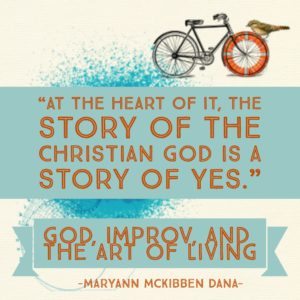 At the heart of this wild book are two big claims that are common sense enough, to my weird ears, anyway, and from which the author extrapolates. First, God wants us to say Yes. And, secondly, that yes, really must be a Yes, And.
At the heart of this wild book are two big claims that are common sense enough, to my weird ears, anyway, and from which the author extrapolates. First, God wants us to say Yes. And, secondly, that yes, really must be a Yes, And.
That is, we must get busy and improvise as we go.
My friends Brian Walsh and Sylvia Keesmaat were the first that I knew to speak playfully and yet seriously about this, and they tell me that some of their insights about this phrase of the Biblical story where we improvise — knowing the earlier acts and having the final act — came from their friendship with N.T. Wright. Sam Wells has a seminal book on the theology of improvisation called Improvisation: The Drama of Christian Ethics – a bit heady, and not too funny, but McKibben Dana draws on it, wisely. Others have preached this process before, but nobody I know has so literally linked it to stuff she learns in the improv class. Her insight about stand up, about comedy, about improvisation, about that vulnerable, pregnant “yes, and…” is fabulous.
It isn’t every Christian book that has a blurb on the back by a comedian with the legendary Second City troupe, but this one does. Sarah Little (also a filmmaker) says of God, Improv, and the Art of Living:
This spiritual guide explores a world of universe-expanding possibility through the simple act of uttering the word yes.
Ken Evers-Hood, author of The Irrational Jesus: Leading the Fully Human Church, says:
Life happens. Living well means improvising, which is a craft that can be practiced and honed. In MaryAnn McKibben Dana we have the gift of an honest, playful, and deeply wise guide. In this book you will find practical insight drawn from the world of improv, tested in the crucible of pastoral ministry, and engagingly told in story after story.”
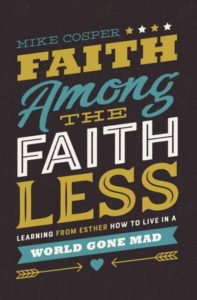 Faith Among the Faithless: Learning From Esther How to Live in a World Gone Mad Mike Cosper (Nelson) $16.99 I have recommended all of Cosper’s books in recent years, from his wonderful book on worship (Rhythms of Grace and the great study of pop culture called The Stories We Tell and the remarkably thoughtful, rich study Recapturing the Wonder.) I list this brand new one now because he is a very fine writer and a very fine thinker and to show that even a Bible commentary can be playful, creative, culturally engaged and full of inspired insight about living well in the very real world.
Faith Among the Faithless: Learning From Esther How to Live in a World Gone Mad Mike Cosper (Nelson) $16.99 I have recommended all of Cosper’s books in recent years, from his wonderful book on worship (Rhythms of Grace and the great study of pop culture called The Stories We Tell and the remarkably thoughtful, rich study Recapturing the Wonder.) I list this brand new one now because he is a very fine writer and a very fine thinker and to show that even a Bible commentary can be playful, creative, culturally engaged and full of inspired insight about living well in the very real world.
Okay, Faith Among the Faithless isn’t really a Bible commentary but it does afford us the chance to do a careful reading of the book of Esther, and invites us to a slightly creative but very faithful re-telling. It really is a book about the book of Esther
I know I say this a lot, but the 10-page introduction is worth the price of the book. Really – what an insight; one I’ve never heard. In it, Cosper warns us of some of the hard, surprising stuff in Esther; one section is called “Less VeggieTales, More Game of Thrones” where he reminds us, among other thigns, of the amount of impaling that occurs in this seemingly godless book. And some pretty gross sexual violence.
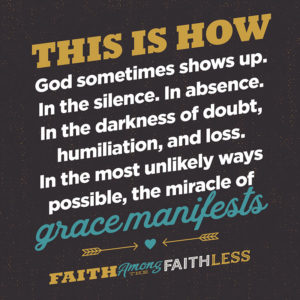 In a fascinating move Cosper says that for those of us looking for faithful presence in the world and uniquely Christian cultural engagement and calls to fidelity amidst our post-Christendom culture, we might find much more sturdy help from the backslidden and compromised Esther and Mordecai rather than the steadfast Daniel. Both are stories set in exile, but Daniel – the hero of so many sermons about cultural transformation — was raised in a firm faith tradition and he knew well the stories of Israel. Alas, it seems (and this is evident in the close reading Cosper gives) our heroes of Esther were far from fidelity, deeply compromised, clearly accommodated to the pagan ethos of the empire of Xerxes et al.
In a fascinating move Cosper says that for those of us looking for faithful presence in the world and uniquely Christian cultural engagement and calls to fidelity amidst our post-Christendom culture, we might find much more sturdy help from the backslidden and compromised Esther and Mordecai rather than the steadfast Daniel. Both are stories set in exile, but Daniel – the hero of so many sermons about cultural transformation — was raised in a firm faith tradition and he knew well the stories of Israel. Alas, it seems (and this is evident in the close reading Cosper gives) our heroes of Esther were far from fidelity, deeply compromised, clearly accommodated to the pagan ethos of the empire of Xerxes et al.
And so, we need “faith among the faithless” – and, surprise — it seems Mr. Cosper is suggesting that the faithless are not just our secularized neighbors but we who are so accommodated to the ways of the world. The world may seem disenchanted (he’s studied his Charles Taylor!) but we can still encounter God through this story of great evil. (And, again, let us not forget, much of the evil in this wild Bible book, is about the oppression of women, of vile and violent practices, vital to appreciate in our #metoo moment.)
Mike Cosper tells the plot of Esther, explains a lot of historical and socio-political background, and gently suggests much about the subversive nature of the rowdy Purim holiday. He invites us to partake. It doesn’t have quite the punch of Colossians Remixed, say, but it has guts and grit and is wonderfully written. Lit prof Karen Swallow Prior (author of Fierce Convictions, a well-written book about another crusading woman, Hannah More) says, “It’s been a long time since I have been so informed, inspired, and encouraged.” That’s quite an endorsement for Faith Among the Faithless.
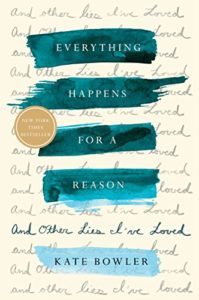 Everything Happens for a Reason And Other Lies I’ve Loved Kate Bowler (Random House) $26.00 I hesitated to list this as I’m sure most BookNotes readers would know of it already; it has garnered so much buzz and been reviewed so well, it is nearly a publishing phenomenon, riding the best-seller list for a while, now. Perhaps in league with the stunning When Breath Becomes Air or Being Mortal it is a book about ultimate things that is exceptionally insightful, beautifully written, raw and wise (and irreverent and funny, too, believe it or not.) With advanced rave reviews from Publishers Weekly and Kirkus, Bowler’s reflection on dying has become a touchstone for many conversations these days.
Everything Happens for a Reason And Other Lies I’ve Loved Kate Bowler (Random House) $26.00 I hesitated to list this as I’m sure most BookNotes readers would know of it already; it has garnered so much buzz and been reviewed so well, it is nearly a publishing phenomenon, riding the best-seller list for a while, now. Perhaps in league with the stunning When Breath Becomes Air or Being Mortal it is a book about ultimate things that is exceptionally insightful, beautifully written, raw and wise (and irreverent and funny, too, believe it or not.) With advanced rave reviews from Publishers Weekly and Kirkus, Bowler’s reflection on dying has become a touchstone for many conversations these days.
Bowler was somewhat known for an Oxford University Press book called Blessed which studied the prosperity preachers. She became a professor at Duke Divinity School. She became a young mom and then got the terrible news about her Stage IV colon cancer. She tells her story bringing us in to a colorful cast of characters with almost unbelievable candor and courage. And what a writer she is!
Her gifts and guts have made Bowler’s Everything Happens…and Other Lies… one of the great books of 2018.
As Glennon Doyle writes:
I fell hard and fast for Kate Bowler. Her writing is naked, elegant, and gripping –she’s like a Christian Joan Didion. I left Kate’s story feeling more present, more grateful and a hell of a lot less alone. And what else is art for? Everything Happens for a Reason is art in its highest form, and Kate Bowler a true artist – with the pen, and with her life.
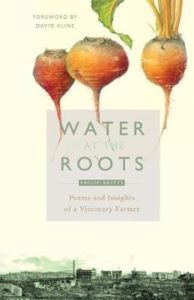 Water at the Roots: Poems and Insights of a Visionary Farmer Philip Britts (Plough Publishing) $16.00 Talk about a handsome book – just the cover and artful design throughout won us over before we even read a page. Happily, the aesthetic quality (most of the book is poetry) is front and center, even though it is a book about agrarianism. That is, very much like Wendell Berry, Philip Britts (1917- 1949) was a poet and a farmer and social activist and a person of faith. He was also a pastor and a bit of a mystic. We are thrilled that our friends at Plough Publishing – the publishing arm of the Bruderhof faith communities – has released these long out-of-print essays, narratives, and poems. And, oh, the poems…
Water at the Roots: Poems and Insights of a Visionary Farmer Philip Britts (Plough Publishing) $16.00 Talk about a handsome book – just the cover and artful design throughout won us over before we even read a page. Happily, the aesthetic quality (most of the book is poetry) is front and center, even though it is a book about agrarianism. That is, very much like Wendell Berry, Philip Britts (1917- 1949) was a poet and a farmer and social activist and a person of faith. He was also a pastor and a bit of a mystic. We are thrilled that our friends at Plough Publishing – the publishing arm of the Bruderhof faith communities – has released these long out-of-print essays, narratives, and poems. And, oh, the poems…
As the folks at Plough tell us, “Britts’s story is no romantic agrarian elegy, but a life lived in the thick of history. The international pacifist community he joined, the Bruderhof, was soon forced to flee from Europe to South America.”
That Britts chose to root himself not only in God but in an intentional community which attempted to restore the land they farmed, makes his simple life itself one of great beauty and courage. He speaks powerfully to our own times, even as he presciently foresaw much that was brewing in the middle of the 20th century with its idolatry of speed and progress and growth. Our age is still “wracked by racism, nationalism, materialism, and ecological devastation” so, as it says in the publishing promo material, “the life he chose and the poetry he composes remain a prophetic challenge.”
 The graphic design of Water At the Roots is striking. There are some grainy black and white photos that are just perfect. The chapter’s that bring together his few essays, reflections and poems, are Wilderness, Ploughing, Planting, Cultivating, and Harvesting. There is a very good – no, wonderful — forward by David Kline, the famous author who has written important, intelligent books about Amish farming methods and his own organic farm in Ohio. He gets Britts’s worldview, his writing, his early anticipation of the problems of agribusiness, his faith, his stewardship of the mysteries. With Kline setting the stage, you will even more deeply realize that Water at the Roots is an important little book. But first, it is truly lovely, artful book.
The graphic design of Water At the Roots is striking. There are some grainy black and white photos that are just perfect. The chapter’s that bring together his few essays, reflections and poems, are Wilderness, Ploughing, Planting, Cultivating, and Harvesting. There is a very good – no, wonderful — forward by David Kline, the famous author who has written important, intelligent books about Amish farming methods and his own organic farm in Ohio. He gets Britts’s worldview, his writing, his early anticipation of the problems of agribusiness, his faith, his stewardship of the mysteries. With Kline setting the stage, you will even more deeply realize that Water at the Roots is an important little book. But first, it is truly lovely, artful book.
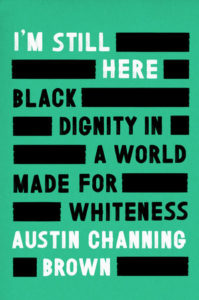 I’m Still Here: Black Dignity in a World Made for Whiteness Austin Channing Brown (Convergent) $25.00 Eloquent, moving, compelling writing about race and racism – like eloquent, moving writing about grief, say – is not uncommon. Something about the worst in life brings out good words, inspired words of rage, lament, insight, grace. That this new book is a smallish hardcover of a certain trim shape immediately brings to mind Ta-Nehisi Coates and Michael Eric Dyson, the decade’s most well-known writing by African American scholars who have worn their broken hearts right on their sleeves and have been catapulted to fame for their eloquence and profundity and wordsmithing. (The trim sized hard-covers that were so very well written and culturally significant to which I refer are, of course, Coates’s Between the World and Me and Dyson’s Tears We Cannot Stop.) It is too early to determine if I’m Still Here will become known as a similarly fervent, well-told story of one black woman’s journey through white America, but it very well might. Christena Cleveland calls it “a stunning debut.”
I’m Still Here: Black Dignity in a World Made for Whiteness Austin Channing Brown (Convergent) $25.00 Eloquent, moving, compelling writing about race and racism – like eloquent, moving writing about grief, say – is not uncommon. Something about the worst in life brings out good words, inspired words of rage, lament, insight, grace. That this new book is a smallish hardcover of a certain trim shape immediately brings to mind Ta-Nehisi Coates and Michael Eric Dyson, the decade’s most well-known writing by African American scholars who have worn their broken hearts right on their sleeves and have been catapulted to fame for their eloquence and profundity and wordsmithing. (The trim sized hard-covers that were so very well written and culturally significant to which I refer are, of course, Coates’s Between the World and Me and Dyson’s Tears We Cannot Stop.) It is too early to determine if I’m Still Here will become known as a similarly fervent, well-told story of one black woman’s journey through white America, but it very well might. Christena Cleveland calls it “a stunning debut.” 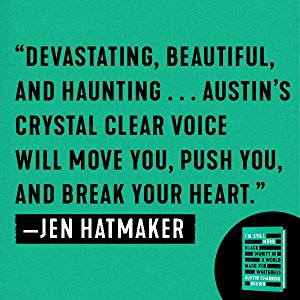
If Coates explored the pathos of his life through his historical and atheist lenses, and Dyson brings his classic, black church intellectual passion – he is a pastor and sociologist – Ms. Austin Channing Brown tells her story of being an evangelical black woman in a largely white subculture. Her telling of her frustration and anguish (and exhaustion) being often the only person of color in mostly white schools, organizations, workplaces and churches, is a story that needs to be told, and we are grateful.
Her candor may upset some readers, but so be it. Like Coates, just for instance, Austin Channing is a person you should know, and I’m Still Here is a book that needs to be read, with words that need to be felt, if even they sting.
Austin is a black woman of searing honesty and serious truth. I’ve read about half of this already – it released just today! – and I hope many order it from us. It not only is an important bit of “insider information” that especially white readers need to hear but, again, in keeping with my theme of this post, it is very well done, astutely written, poignant and passionate. Even if it didn’t glow as it does, it would be worth working through. But like the gripping Coates and Dyson, the words matter and the writing is itself make I’m Still Here a real standout. Highly recommended.
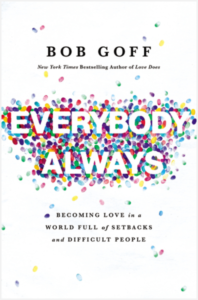 Everybody Always: Becoming Love in a World Full of Setbacks and Difficult People Bob Goff (Nelson) $16.99 We’ve already announced this one; we were very, very happy to describe it here the week it arrived. We knew then that it would be an energetic, upbeat read and we have certainly not been disappointed. There’s a reason it has zoomed to the top of the best-sellers list.
Everybody Always: Becoming Love in a World Full of Setbacks and Difficult People Bob Goff (Nelson) $16.99 We’ve already announced this one; we were very, very happy to describe it here the week it arrived. We knew then that it would be an energetic, upbeat read and we have certainly not been disappointed. There’s a reason it has zoomed to the top of the best-sellers list.
Bob is one of the most dynamic storytellers working these days and his great skill at telling fun and funny and poignant tales is so very compelling because his real life is full of nearly manic goodness. His capers are improvisational, his experiments in serving others makes for fantastic chapters, his charm should be contagious, his passion to share Jesus’s love with other is extraordinary. You’ve never met anyone like him and you will be entertained for hours by going along for the ride through his amiable, interesting book. More importantly, as we read, we’ll be caught up in the drama and – let’s hope – find ourselves joining him in this parade of generosity.
Two customers — two the same day! — told us last week that they are reading only a chapter a day because they don’t want this book to end. They loved his popular Love Does and they are loving this. You will too.
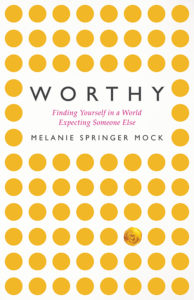 Worthy: Finding Yourself in a World Expecting Someone Else Melanie Springer Mock (Herald Press) $16.99 I was intrigued by the curious cover – see that one little circle that’s different? — and was intrigued by the first line of the excellent foreword by Carolyn Custis James who says “Every once in a while, a book lands on my desk that I wish I had read when I was in college. Worthy is one of those books.”
Worthy: Finding Yourself in a World Expecting Someone Else Melanie Springer Mock (Herald Press) $16.99 I was intrigued by the curious cover – see that one little circle that’s different? — and was intrigued by the first line of the excellent foreword by Carolyn Custis James who says “Every once in a while, a book lands on my desk that I wish I had read when I was in college. Worthy is one of those books.”
Bromleigh McCleneghan, herself a sometimes spicy author, says it is “Wise, cantankerous, charming” and Evangelicals for Social Action editor Elrena Evans nicely notes that “Reading Worthy is like sitting down for a cup of coffee with a best friend you didn’t know you had.”
I agree. This book is important and smart – getting at the question of our worth, how we often harbor fears that we are enough, hinting at the problem of shame and hurt. And what it means to find one’s deepest sense of calling in the world – it is all very well done. There are good stories and excellently-crafted illustrations and no small amount of incisive cultural criticism in this work. It is life-giving and enjoyable and good, even when she is poking hard at evangelical customs and cheap religious advice. Mock is an English professor (at George Fox University) so she knows good literature, has an ear for good writing, and is gifted at weaving her own curious narrative into her critique of the massive self-improvement industry and a church that too often offers up cookie-cutter formulas for happiness that are themselves skewed and distorted.
Worthy: Finding Yourself… is a book of liberation and hope and it’s a wonderfully charming read. What a book, for men and for women, by the way. You will enjoy it and you will want to share it with somebody you know, I’m sure. It’s that good.
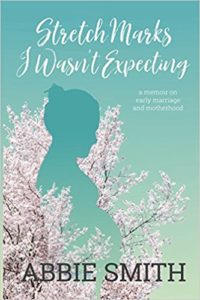 Stretch Marks I Wasn’t Expecting: A Memoir on Early Marriage and Motherhood Abbie Smith (Kalos Press) $15.95 Kalos Press is an small, indie publisher we like a lot; that they do artful, well-written and spiritually sound books like this is the main reason why. We were thrilled to announce this when it came out nearly a half a year ago but we’ve not had the opportunity to tell you about it again… although I’ve been itching to. Stretch Marks… is sort of a memoir, well told and delightfully interesting, but which includes spiritual reflections and Bible explorations. It is about the early years of the author’s marriage and her becoming and being a new mom. And it is so much more; a lot, actually.
Stretch Marks I Wasn’t Expecting: A Memoir on Early Marriage and Motherhood Abbie Smith (Kalos Press) $15.95 Kalos Press is an small, indie publisher we like a lot; that they do artful, well-written and spiritually sound books like this is the main reason why. We were thrilled to announce this when it came out nearly a half a year ago but we’ve not had the opportunity to tell you about it again… although I’ve been itching to. Stretch Marks… is sort of a memoir, well told and delightfully interesting, but which includes spiritual reflections and Bible explorations. It is about the early years of the author’s marriage and her becoming and being a new mom. And it is so much more; a lot, actually.
Abbie has been a writer for years – she wrote a helpful book for college students about honoring God in their collegiate lives, she wrote another about sexuality back when she was a pensive single woman. She is lively and literate; she has even spoken a few times at our beloved Jubilee Conference in Pittsburgh. After earning an MDiv in spiritual formation (at Talbot) and getting married to a wonderful, thoughtful guy, she and her husband became caretakers of Wesley Gardens Retreat in Savannah, Georgia, where they attend an Anglican congregation. I love her blend of generous self-reflection and her deep awareness of the contemplative and liturgical traditions. She blends them nicely in what she calls “noisy graces.” You gotta love that, eh?
Abbie is a charming storyteller and a serious thinker and uses the Bible well in her meditations and teachings. She has honed her craft of writing and it shows in this mature and thoughtful memoir.
As writer Marlena Graves says
Abbie does a masterful job of bringing the reality of ‘noisy graces’ to the fore and demonstrating that we too are being formed even as we seek to disciple and form our children. Read and hand out to the mothers you know – and dads too!
Chapter titles are allusive and intriguing with titles like chopped, womb, ache, form, rest, manna, safe, dust and more. There is plenty of Scripture, an occasional quote from contemplatives or prayer books, from the Book of Common Prayer to the Puritan Valley of Vision. There are 18 chapters and a very good reflection guide that makes this a great choice for a book club or small group or for one to use in one’s own quiet time of soul care.
I’m going to go out on a limb here and invite you to consider something: even though this a memoir of the early years of a woman’s marriage and how she was changed by parenting her young children (biological and adopted) this is not just a book for new moms. It is such a good read that it could be entertaining and insightful and good for almost anyone. Highly recommended.
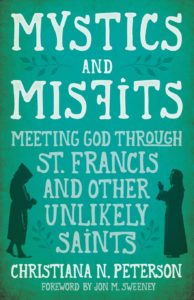 Mystics and Misfits: Meeting God Through St. Francis and Other Unlikely Saints Christiana N. Peterson (Herald Press) $16.99 This is a beautiful book, surprisingly so, even. There are many informative and nicely written books on historic saints and there are plenty on Francis so it is understandable not to jump immediately on yet another. But trust me. This is remarkable.
Mystics and Misfits: Meeting God Through St. Francis and Other Unlikely Saints Christiana N. Peterson (Herald Press) $16.99 This is a beautiful book, surprisingly so, even. There are many informative and nicely written books on historic saints and there are plenty on Francis so it is understandable not to jump immediately on yet another. But trust me. This is remarkable.
Many of us have taken comfort the way the literature reminds us that the great monks and mystics and saints and heroes of the faith have often been, well, quirky; a bit strange and ill-content. Counter-cultural. Weird, even, if you want to be honest about it. And so, I was immediately struck by how this word pairing – mystics and misfits – rolled off the tongue. It is important to remember that the saints and spiritual masters we most admire were odd and often subversive, and that little alliteration in the title gave me hopes that Peterson would not just bring the hard truth of the counter-cultural nature of deep spirituality but would do so with charm and wit and literary grace.
And did she ever! This M&M book is so very interesting, so soulful, so moving, that we truly want to tell everyone who loves good books about it. Writer and editor and Francis fanboy Jon Sweeny himself says it is “achingly beautiful” – a blurb which drew me in wondering if that could be true, prose approaching the sublime. Another review called it “gorgeous and quirky.” Richard Rohr observes that it is “so well written” and promises that it is also “filled with gems.” Mystics and Misfits: Meeting God…, like others we’ve mentioned in this list, is a work of art, a wonderful read, an expertly crafted, fabulous book.
Christiania Peterson’s style is curious – there are standard-type chapters, there are interludes, and even letters written to several old saints, which are actually fantastic and slyly clever. (She calls Dorothy Day a “saint for difficult people.”) There are memoir-like chapters of her own life unfolding as she studied the saints and there are chapters with simple, clear summaries of the lives of many great mystics (from Francis and Clare to Simone Weil to Margery Kempe to Dorothy Day.) I’m not sure if I’d best describe this as a book about the mystics and misfits and how a woman was inspired by them, or a memoir of a woman who happened to take inspiration from her study of the saints. There’s a lot of her own story – an adventurous move to an intentional Christian farming community, a hard story of a floundering Mennonite congregation, a tale of betrayal and exhaustion and struggles, with the farm and the people. Still, as the publisher promises, she writes “with a contemplative’s spirit and a poet’s eye” helping us all encounter wild mystics and weird misfits and “the God who loves us madly, no matter how disillusioned we are or how miserably we fail.” Very highly recommended.
+++
I suspect, dear readers, that most of these books will not be on the Christian best-seller lists. I don’t mean to feed our cynicism about such things, but they are mostly just too good. Many of the religious stores you know most likely don’t even stock these. We want to commend them for how well done they are, how interesting, how entertaining, how helpful. They should not be rare and the publishers deserve our support. Lustrous books like this can transport you into the lives of others and you will come out better for it. Live it up. Buy some beautiful books.
BookNotes

SPECIAL
DISCOUNT
ANY ITEM MENTIONED
10% Off
order here
this takes you to the secure Hearts & Minds order form page
just tell us what you want
inquire here
if you have questions or need more information
just ask us what you want to know
Hearts & Minds 234 East Main Street Dallastown PA 17313
read@heartsandmindsbooks.com
717-246-3333
